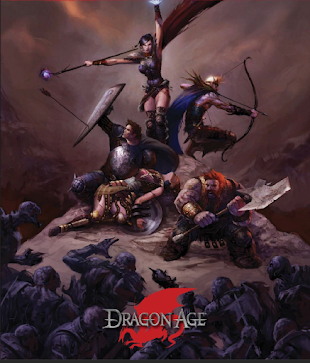Story and Character Development
"If you watch the show, you'll not that Wil teases a lot of information out of the players about their characters in the early episodes. He then uses that information to customize the adventure, which allows for both story and character development." - Titansgrave: The Ashes of Valkana
Typical Narrative Development
In typical narrative stories,
be it a book a movie, or a TV show, we are often getting a story told to us by
a single author or in some cases a small group of authors. Because these
narrative delivery systems are one way, we are simply observers or listeners, watchers
or readers, as this story is presented in front of us. We don’t get a say in
what choices the characters make, we don't get a say in the bits of lore and
other details that hopefully make a world feel realized and lived in.
As game masters we can often fall into the “trap” of being
storytellers. This idea that we have created a narrative, a story with expected
beats and moments of plot development that we set before our players to follow.
Often times there is an expectation that players will act in a specific way because
the narrative demands them to. This expectation is the “trap”, and in my
experience is almost never the case.
Narrative development in Adventures
In truth, a good
roleplaying game is a collaborative affair. Our job as Game Masters is not to
tell a story, but rather to guide one . The first edition AD&D Players
Handbook and Dungeon Masters guide refers to Game Masters as “referees”
throughout both texts. I believe this is certainly half of the job that we do,
managing the game and the rules. But the part where we guide the story sees us
more as narrators than as storytellers or authors. It’s our job to take the
actions of the player characters and describe how the world reacts to that.
It’s not our job to dictate what the player characters do in any given
scenario.
Of course the world can have expectations; this door needs
that key, this creature can only be killed with that enchanted weapon, and so
on. If the characters decide to forego those requirements, they may suffer the consequence
as may various parts of the game world.
And of course it must be said that there is an implicit contract between players and GM’s that players should expect to take the narrative hooks a GM presents but what they do on the course of that adventure should largely be up to them afterwards.
Character Development
Through the course of play characters will grow and change. There are obvious mechanical changes that will happen in most RPG systems: increases to health, gains in power levels, accrual of magic items and other powerful gear all leads to a sense of development. But the stories of these characters can and should also grow and change throughout play. These changes will be based on their interactions with the world; allies that they make and lose, enemies that they confront and defeat, back stories that are explored and fulfilled can all have profound impacts on the life of a player character.
Even if the game you play is a strict “kick in the door, grab the loot” fantasy role play experience, the change to a characters wealth and potential lifestyle from the gain of those riches is still a form of character development in the sense that they may now be able to live the kind of life they desire even if it may also be at the end of the campaign.
What this means is that the character development we seek to facilitate should actually be the main narrative driver in our games. The exploration of a characters bonds, goals, fears, and unresolved histories should be intertwined throughout the story of the game managed by the Game Master. Following this principle, we see then that character development IS story development.
Story Development
The caveat we have to make to the statement above is that while Character Development IS Story Development, it doesn’t have to be the only form of Story development, or even the main kind. We can run games with dynamic worlds that respond to the actions of the Characters. If a villain is thwarted and must devise a new plan, that’s story development. If two plot threads are presented to a party, the option they DON’T pursue may continue to spiral out of control in their absence. This is story development too.
Focusing more on other forms of story development is completely fine, and if it works for your gaming group, than it is the right way to go. For my part though, games where the characters and their development are at the forefront of the story tend to have more positive memories about the experience. They feel more organic and have increased player engagement as they are obviously invested in the growth of the characters they have crafted. Other forms of story development are used, and they are in fact vital to an exciting campaign, but in my games the characters drive the narrative, not the other way round.
-The RPG Study



Comments
Post a Comment